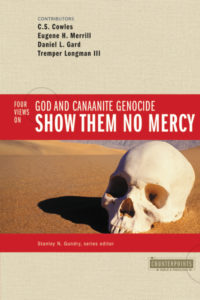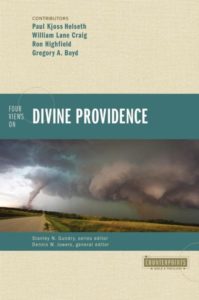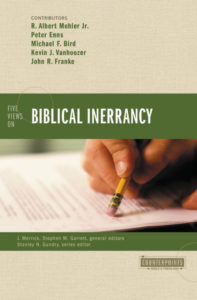This article is part of a progression

Year Published
1990
Authors
Topics
Synopsis
Overall Rating
Final Thoughts
Year Published
1990
Authors
Topics
Synopsis
Final Thoughts
Overall Rating
Progressive Creationism
In this chapter, we see a more modern, while still retaining tradition, view of the creation story. The author presents the idea that the earth is, however, many years old and created by God. What I admire about this position is its desire to reconcile the Bible with Science. The author recognizes that both the Bible and nature were created by God and, as such, they must tell us the same truths. We even see in the Bible that nature speaks to us about God and His truth. So, at least to me, it makes sense that we should be trying to find the common truth between both sets of revelation (as we ourselves call them) God set up for us.
Any Christian that denounces scientific evidence is denouncing one of the revelations that God has given to us about Him. We’re denying the truths that he’s put into place in our world simply because we don’t always know how to understand them. So now the question is- how do we understand the Bible so that it and science tell us the same things?
One way is through progressive creation. In this view, God creates the world as described in Genesis, but it doesn’t happen in six literal days a few thousand years ago. The view presented here (as there are many others) takes the literal days seriously, but with expansive periods of time between them. So on day 1, God began work. Lots of time passed. Day 2 he started to do something else. Lots of time passed as he was working on it. Etc. This viewpoint reconciles the evidence we have for earth’s age with the poetic (yes, it’s poetic) language of Genesis into a cohesive whole.
I like this chapter because he actually presents some of the scientific evidence for the viewpoint. He also makes a very important point- when Christians don’t have enough information to satisfy them they over-interpret what the Bible says in order to be happy. Take the wise men. It says nowhere that three visited, but we like to know things so we decided that’s how many.
Another example of this fallacy directly related to the issue at and is death before the fall. Nowhere in the Bible does it say that death didn’t exist before the fall (either animal or human). And, if no death was happening before the fall than the earth would have very quickly become overflowing with animal life because there would be no population control. We just decided that death was a consequence of the fall because when they ate the fruit they would surely die. Clearly, that means no animals died before that either, right? That just doesn’t make sense. But beyond that, why do we believe that humans were created to not die? What was the other tree in the garden? The tree of life. After they sinned they were banned from the garden and an angel was put in place to protect it. Perhaps humans were created (like any other animal) have a natural life cycle with death at the end, and the other thing sustaining immortality was eating from the tree of life. That allows for death before the fall in all counts (as we would expect in the natural order that God set up) and the immortality of man was the direct intervention of God through a specific tree. After the fall, death (this time both physical and spiritual) came into dominion over humans. Viewing the texts this way keeps their truth, but also aligns them with what we know from our study of nature. (There’s a lot more nuances and complexities to this discussion that I don’t want to take up space with here, so if you’d like to discuss it more of have comments, questions, concerns let me know).
I greatly appreciate the author’s views on the likelihood of life coming without someone actively creating it. There’s just no way life came about from nonlife (which is actually a law within science that is continuously ignored when it’s most convenient for them) without direct intervention from something without nature. (Note- the author does seem to indicate that these things happened under natural circumstances directed by God, but that just seems illogical to me. God directly intervening is the more realistic view for me.)
He moves on to discuss how God probably didn’t create every creature that you see today at one time. Rather, he created them “according to” their kind, which often refers to classification, and from there allows nature to take over and create the various difference and subspecies we have today. This is to say that Genesis 1 does not rule out the theory of evolution, but, perhaps, gives credence to it that God created the classifications and then allowed nature to do its own work from there.
The biggest issue within this viewpoint is that of Adam and Eve. How do we reconcile the Genesis 2 account of creation of man/woman with the scientific evidence we find? Some view humanity as simply the next step in the evolutionary line, having come from apes and monkeys before. The question there lies in who are Adam and Eve in this instance? Are they special humanoids that God blessed above the others with the gift of humanity? If not, were they even real people or simply a myth that is perpetuated in order to show the need for saving?
Others view Adam and Eve as a direct action of God intervening in nature to create a new creature that had not existed before. This fits better with the Biblical idea that Adam and Eve and their actions were historical events in history. But how well does it reconcile with the scientific evidence? Do we see humans suddenly appears in the fossil record? The views on that are varied. The author of this section tends to believe the latter idea. I am still undecided and will wait till after reading the next section to come to my own conclusion.
The author takes a few pages to discuss why this topic is important, which I find invaluable. There’s a trend within science to exclude anything God related. On the other side, there’s a trend within Christianity (especially conservative Christianity) to exclude anything science related. They’re seen as mutually exclusive. IF they’re allowed to discuss the same topics, some view Scripture as more of a “who” and “why” and science as a “how” and “when.” (This is typically done by those of a more liberal persuasion.) In any event, as we discussed above, both Scripture and science are truths of the world given to us by God, so why do we spend so much time separating them into their own categories and saying, “you can only talk about this” and “you can only talk about that” instead of saying, “you’re both telling me about this. what is similar between you two, because that’s most likely the true story.”
I do, still, have some problems with the chapter, though. There’s one point where he describes how young earth creationists try to explain the star light by stating that the light was created in motion. The author calls this “fictitious history” and considers it a lie. I find that to be quite outlandish. God didn’t create the animals as embryos and grow them outside the womb and until they were mature. (At least, I don’t think anyone would argue that he did.) And yet we don’t consider that fictitious history of the animals, so why is light created in transit such a big problem to believe in? It doesn’t make God a liar. God creating and setting up a fully functioning system would make the most sense to me if He chose to create the universe all at once.
We’ve got one more section before I decide where I stand on the issue.




